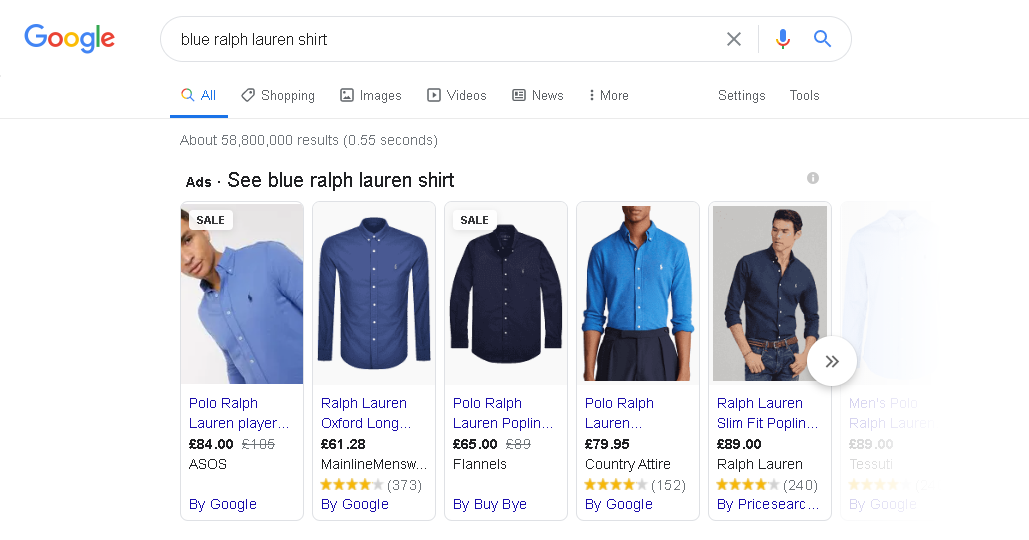PPC (Pay Per Click) advertising is the best way to get your product in front of potential customers searching for similar products. This blog will help you understand what PPC is and how it can be used for ecommerce. We will also show you how to get started with ecommerce PPC and some methods to help with marketing your product online. Lets get started on PPC for Ecommerce.
How PPC advertising works
How exactly does PPC work? Whether or not an ad is displayed in the first place is all determined by the keyword the advertiser originally bidded on.
Some keywords are searched more than others. This means that the higher the volume of traffic a keyword receives, the more expensive it is to bid on. Essentially this refers back to the amount of demand for a keyword.
Why is PPC so important to ecommerce businesses?
PPC is important when operating an ecommerce business. It enables you to compete with other companies that sell similar products to you.
It also enables you to reach audiences that you may not have through organic search results. As well as helping to support an increased amount of traffic in comparison to relying purely on SEO strategies.
PPC is especially important to any new ecommerce businesses too. It can take a while to see organic results which can soon become demotivating. With a well optimised PPC strategy you can see instant results, if done correctly.
What is Ecommerce PPC?
PPC in ecommerce is where advertisers pay a fee each time their ad is clicked. As a paid advertisement their ads are shown higher up in Google’s search results since they are willing to pay for people to visit their website. A great way to reach the top of the search results for your chosen keyword.
Typically an ad is easily identified on the SERP (Search Engine Result Page) with it being labeled in comparison to organic results. Much like the example below.

But how does this benefit ecommerce businesses?
PPC is a very powerful tool for generating instant traffic to your ecommerce website if done correctly. Compared to SEO (Search Engine Optimisation) strategies that can take time to generate traffic to your ecommerce shop. Let’s discuss the types of PPC you can implement into your ecommerce business and why.
PPC keyword research
An advertiser needs to know what type of keyword someone is likely to type into a search engine when looking for their products or services. If the advertisermarketer does not bid on or select the specific keyword, then their ad may never appear when someonethat person searches for a certain product.
Keyword planning is key in the research and development of creating an online advertising campaign. Certain keywords can directly contribute to the success of your PPC ads.
However choosing the wrong keywords will cause you to attract users with the wrong search intent for your products. This will result in wasted money each time they click on one of your ads and a very high bounce rate for your target landing page. Setting up what is known as ‘negative keywords’ will tell the search engine to not display the ad when that particular keyword is included in the user’s search.
Types of PPC advertising
There are many different types of PPC ads that are all great ways to increase traffic to your online shop. Here is a list of the different types of ads you can utilise for your business.
- Search ads
- Display ads
- Social ads
- Gmail sponsored promotions
- Remarketing ads
- Google shopping
- Instream ads
- Local service ads
However rather than implementing all these methods you should focus on choosing only the ones that would work best for your ecommerce business and product. Also understanding which platform your target audience uses the most is key in getting optimised results.
We will explain in more detail below some of the better ROI (Return on Investment) ways of advertising your business – Google Shopping and remarketing tactics.
Google shopping
The first ad strategy we’re going to talk about is Google Shopping. Google Shopping is a relatively new advertising format which allows retailers to provide an overview of their products in a list format. According to FATJOE, Google Shopping ads in the UK amounts to 82% of retail spend.
The advertiser will only pay when the product is clicked on. It will not cost the advertiser if the product is displayed and not clicked on.
These ads will only be displayed when the search keyword is included in the search query. In the example below, these advertisers will be bidding on the keyword ‘Blue Ralph Lauren Shirt’.

Google Shopping features the main product information including an image, price, reviews and the business name. A great benefit of using Google Shopping is it reduces the number of clicks and therefore friction in the users buying journey, the user must take to reach the product page where they can then purchase the product.
Google Shopping ads are a great way to advertise your products or services directly on Google search pages. However many people do not know how to set up their Google Shopping campaigns and what exactly they should be doing. If you are an EKM customer you can get prepared to use Google Shopping by learning how to submit your product feed to Google here.
Remarketing ads
Remarketing ads or also known as retargeting ads, helps to keep your ecommerce business in the minds of your potential customers.
But how do remarketing ads work? A tracking pixel placed on your ecommerce site, collects visitors information. Based on the interactions the tracking pixel collects you can later display remarketing ads to show them the products they were interested in, or services you offer. Remarketing ads can be shown on places like Facebook using the Facebook Pixel, Instagram and Google Display Ads.
If you have ever been browsing products on a website and then a few hours later see the exact same products being displayed on a social media platform then you are being remarketed to.
The majority of users that visit your site will not convert on their first visit. With remarketing ads, you can place those visitors back in the path to conversion. If done correctly, this increases sales for you while also lowering cost per conversion.
Remarketing ads often have a lower cost per conversion in comparison to other PPC methods. This is because the user being targeted already has an interest in the products or services that you offer. This method of PPC is cost effective for new ecommerce sites with a smaller budget.
One of the many tracking pixels to install on your ecommerce page to start with is the Facebook Pixel. In order to start building a list of customers that you can remarket ads to, you must first install the Facebook Pixel on your ecommerce site. If you are an EKM customer you can learn how to add a Facebook Pixel to your EKM online shop here.
Undertaking keyword research for PPC
There are numerous ways to undertake keyword research. You can use Google Trends that are related to your product or service to get a general idea of the search intent. Even the Google search results page can give a good indication of other keywords customers are searching for. Simply scroll down to the bottom of the page to find an area called ‘searches
related to’.

This can give a good indication of keywords that you could be forgetting to use in your PPC ads that are still relevant to your product or service.
For greater and more accurate results you will want to use Google’s keyword planner. This will not only help you with understanding the traffic each keyword receives but also the cost for bidding on that particular keyword. Ahrefs have written a great comprehensive guide to understanding how to use Google keyword planner which you can read here.
Do you need a PPC agency?
There is a lot to take in when it comes to PPC ads and which method is right for your ecommerce business. It is easy to waste your money targeting customers who are not interested in your products.
Meaning many opt to seek professional help when it comes to running PPC campaigns. Although it may cost more money in setup fees, you will be guaranteed to save money in the long run by having optimised campaigns run by professionals.
EKM has our very own Google Specialists in house. Our team of dedicated PPC professionals, are here to help you increase sales and grow your business. You can read more about our Google Shopping Management Service here.
You should now have a firm understanding of how PPC works and be able to understand how it can be beneficial to your ecommerce business. As well as being cost effective PPC ads can help businesses reach new customers. Just remember to undertake keyword research beforehand and if in doubt speak to one of our Google experts.








